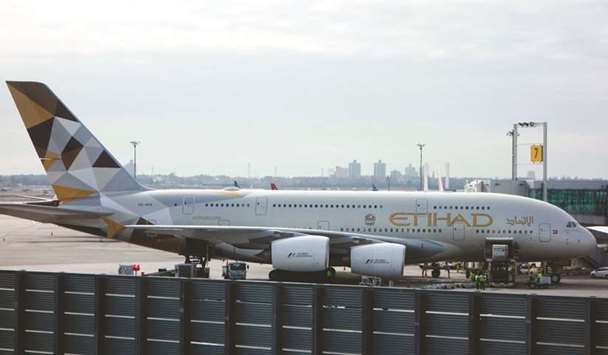Etihad Airways has recorded a $1.87bn annual loss for 2016 that came after the Abu Dhabi-based carrier booked a $1.06bn charge from writing down the value of aircraft and a further $808mn hit from the reduced value of stakes in so called equity partners including struggling Air Berlin and Italy’s Alitalia, which filed for bankruptcy in May.
The earnings reversal, revealed yesterday, comes after Dubai-based Emirates, the biggest Gulf carrier and the world’s largest long-haul airline, in May reported its first annual profit decline for five years.
“This year is just as challenging for the global aviation industry and the ever-evolving competitive environment is likely to impact overall performance in 2017,” Ray Gammell, interim chief executive officer of Etihad Aviation Group, said in a statement.
The loss was equivalent to almost 40% of Etihad Air’s passenger revenue and more than 20% of its overall revenue of $8.36bn. The company, which had a profit of $103mn a year earlier, didn’t publish full group numbers, and the hit from partners includes only the impact of commercial ties rather than losses there.
Pressure on Etihad has mounted further this year after President Donald Trump’s administration sought to restrict travel to America by people from a number of Muslim-majority nations and later imposed restrictions on using electronic devices in the cabins of US-bound planes departing Mideast hub.
While the curbs watered down after being blocked in court and the laptops ban removed, Etihad, the third-biggest Gulf carrier, said last month it will scrap flights to San Francisco in October citing lower-than-anticipated fares.
Emirates had earlier moved to eliminate 25 weekly flights to the US.
Delta Air Lines, American Airlines Group and United Continental Holdings have accused their Gulf rivals of competing unfairly by taking subsidies from their state-owners, a claim the Mideast operators reject. The US carriers have also lobbied Trump to limit access to the US.
Emirates said in its earnings release that the last year had been punctuated by a run of “destabilising events” including terror attacks in Europe and the Mediterranean, Britain’s vote to leave the European Union and an immigration crisis linked to conflicts in the Middle East, as well US travel policies.
Etihad is continuing to implement group-wide changes as part of a strategic review, Gammell said, as well as assessing its minority holdings following an exit from Switzerland’s Darwin Airline last week. The group is also continuing its search for a permanent CEO following the exit of Australian James Hogan.
Yields, a measure of fares, fell 8% in the year, Etihad said. Prices dropped across all cabins, with business class worst hit as some premium travellers downgraded to coach with crude still in the doldrums. Fuel hedging also hurt its performance but should have less of an impact this year, it said.
Overhead costs were cut by 4% through job cuts and other measures, and the airline has introduced a new fees to boost ancillary revenues from perks such a neighbour-free seating for economy-class passengers.

An Etihad Airways is seen parked at the terminal on March 21, 2017 at John F Kennedy International Airport in New York. The Abu Dhabi-based carrier has booked a $1.06bn charge from writing down the value of aircraft and a further $808mn hit from the reduced value of stakes in so called equity partners including struggling Air Berlin and Italy’s Alitalia, which filed for bankruptcy in May.
